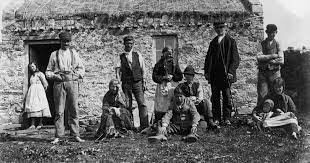The Irish Potato Famine, also known as the Great Famine, was a period of mass starvation and disease in Ireland from 1845 to 1852. The famine was caused by the failure of the potato crop, which was a staple food for the Irish population. The famine resulted in the death of an estimated one million people and forced another two million to emigrate.
Despite the tragic circumstances of the Irish Potato Famine, there are still survival lessons that can be learned from the experience. Here are some of the key takeaways:
Diversify Your Food Sources: The Irish relied too heavily on the potato crop as their primary source of food. When the crop failed, there were no other crops to fall back on. It's important to diversify your food sources and have a variety of crops and livestock.
Store Food: With a failing potato crop, the Irish were left without enough food to survive. Having a stockpile of food and supplies is crucial in a SHTF scenario. It's important to store food in a cool, dry place and rotate your stock to ensure that it doesn't expire.
Community and Cooperation: During the Irish Potato Famine, communities came together to help each other survive. Cooperation is key in a SHTF scenario, and having a strong community that can work together can greatly increase your chances of survival.
Self-Sufficiency: Many Irish families had to rely on their own resources to survive during the famine. Learning how to be self-sufficient in terms of food, shelter, and water is crucial in a SHTF scenario.
Adaptability: The Irish had to adapt to their new circumstances and find new ways to survive. This included emigrating to other countries, changing their diets, and finding new sources of income. Being adaptable and open to change is an important survival skill.
Preparedness: The Irish Potato Famine was largely a result of poor planning and preparedness. In a SHTF scenario, being prepared and having a plan in place can mean the difference between life and death.
In conclusion, the Irish Potato Famine was a tragic event, but there are still lessons that can be learned from it. By diversifying your food sources, storing food, building a strong community, being self-sufficient, staying adaptable, and being prepared, you can increase your chances of survival in a SHTF scenario.


Comments
Post a Comment